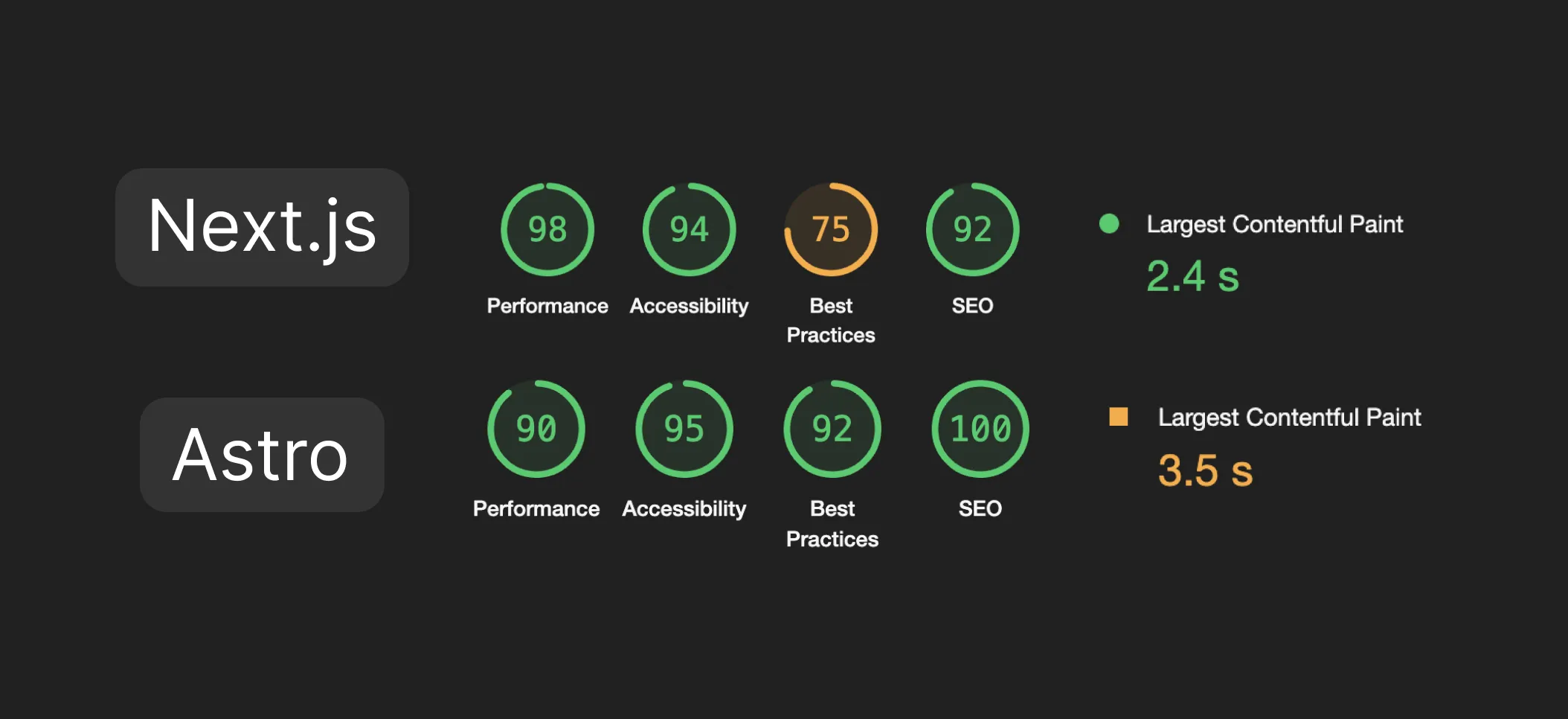About the ups and downs of switching my Next.js blog over to Astro

The site you’re reading this on is now built with Astro.
The primary reason I made this change was to improve my blog post writing experience.
My previous Next.js implementation of this blog had a “custom” MDX parsing implementation. While that was super flexible and allowed me to do some interesting things in the MDX -> React conversion process, the process of actually authoring a new blog post wasn’t great.
It sucked primarily because it lacked any kind of hot-reloading. So every time I wanted to see a change reflected in the browser, I had to refresh the page and scroll back down to my area of interest. ohmahgosh it was so frickin’ annoying.
Astro totes itself as a “content focused” framework, and I have heard good things about it’s ability to parse MDX, so I thought it might be able to help me improve my authoring issues.
A brief history of this blog
Section titled: A brief history of this blogMy first ever attempt at a blog was in 2015, using the original AngularJS. A lot has changed since then, but I was still able to get every version of this blog up and running locally again to take these screenshots!
| Version | Started | Framework | Language(s) | CSS | Content | Package Manager | Other Notable Tech | Screenshots |
|---|---|---|---|---|---|---|---|---|
| 1 | Oct 2015 | AngularJS, angular-ui-router | JavaScript, Coffeescript | SCSS | markdown | bower | compass | Home, Blog |
| 2 | Dec 2016 | React 15 | JavaScript | CSS modules | markdown | npm | webpack, react-static-boilerplate | Home, Blog |
| 3 | Jan 2019 | Next.js 9, React 16 | JavaScript | styled-components | markdown | yarn | prettier | Home, Blog |
| 4 | Dec 2021 | Next.js 12, React 17 | TypeScript | Tailwind CSS | MDX | yarn | storybook | Home, Blog |
| 5 | Sep 2023 | Astro 3, React 18 | TypeScript | Tailwind CSS | MDX | bun | Home, Blog |
The best parts of Astro
Section titled: The best parts of AstroHot reloading in MDX Files
Section titled: Hot reloading in MDX FilesThis is the reason that I turned to Astro in the first place, and as expected my blog post writing experience has improved dramatically.
Imports in MDX Files
Section titled: Imports in MDX FilesIn my previous “custom” implementation of MDX parsing, I had to pass every React component that could possibly be used in an MDX file into the MDX parser. But Astro can parse JS imports in MDX files, which is a much more elegant solution.
Content APIs
Section titled: Content APIsAstro’s Content Collections APIs are brilliant. They do a great job of abstracting away the processing of MDX files. In order to get a list of my blog posts, this is all the code that is necessary:
await getCollection('blog')The mixed parts of Astro
Section titled: The mixed parts of AstroPerformance
Section titled: PerformanceComparing lighthouse scores between my Next.js app and this Astro app (on the home page) gives mixed results:

As you can see, best practices gets a nice boost and SEO goes all the way up to 100! But what is most interesting to me is the 8 point drop in performance — 1.1s in LCP is a non-trivial difference!
Both apps are statically rendered into HTML at build time, and both apps were deployed on Vercel during this test. One would think that Astro’s “Dynamic Islands” might give it the edge here, but it seems to have been a non-factor.
When I first ran these tests there was actually a 13 point performance differential, but taking advantage of the Astro <Image> component to serve my images as .webp files brought Astro’s performance up to 90.
The remaining difference according to Lighthouse is a lack of Astro automatically inlining Google fonts. I might look into that more later try and do so manually.
The unfortunate parts of Astro
Section titled: The unfortunate parts of Astro.astro files
Section titled: .astro files.astro files are necessary to Astro as a framework because they’re what enables the core concept of “dynamic islands”. Having their own file type is also what allows Astro to simultaneously support multiple frameworks (React, Svelte, Vue, etc.).
Unfortunately I’ve found dynamic islands to be annoying in practice. It’s so easy to forget the client:load attribute on an island, and then you’re left staring at the page wondering why your code isn’t working.
In addition:
- These custom files also require a custom VS Code extension which has crashed and/or failed to start for me on a regular basis. Whereas support for the plain React files used by Next.js is built into VS Code and works flawlessly.
- Astro files only have a default export so they can’t be exported from barrel files without doing
export {default as Component} from './foo.astro'. - Astro built-in components are limited to .astro files, which means they’re limited to top-level components if the rest of your components are React components. Or you’re forced to go through the awkward process of converting some of your lower-level React components into
.astrofiles. - You can’t create a little helper sub-component in the same file.
- Because .astro files can’t have client code in them directly, this means that you’re forced to use them in combination with a framework to achieve client side functionality. The co-existence of part Astro and part (in my case) React is kind of messy. Especially when more and more “lower level” components are converted to .astro files in order to use something like
<Image>.- Have an Astro component that you need to add client functionality to? Well now you have to do the opposite conversion 😖
Issues with nested components in MDX
Section titled: Issues with nested components in MDXFor reasons that I don’t understand, nesting multiple React components inside of an MDX file causes weird rendering issues with those nested components, especially if you try to use client:load on any of those React components. In order to make it work you have to break it out into a separate file and then import that file into the MDX file (as a single, un-nested component).
Hot reloading in JSX Files
Section titled: Hot reloading in JSX FilesIronically, given the reason I switched to Astro was to improve hot reloading in MDX files, Astro’s hot reloading in JSX files is sometimes broken. My home page component for example has at certain times during the development process refused to hot-reload, and other times it has worked just fine.
I don’t know what about the component causes it to break. I’ve seen it happen with the smallest possible React component (literally just returning a string). I’ve had a component hot-reloading just fine, copy-pasted its contents into a different file and now that file wouldn’t hot-reload.
The CLI spits out the file name correctly every time it’s edited, but the page simply doesn’t update. I’ve done some messing around to try and figure out if one part of the page specifically is causing the issues, but to no avail.
This is happening with astro@3.0.12 and @astrojs/react@3.0.2, so hopefully maybe it will be improved in the future.
Conclusion
Section titled: ConclusionWith some of the weird issues I’ve run into with Astro, it feels at times like I’m still using beta software. And a few times because I’ve lacked trust in the framework, I have annoyingly blamed some problem on the framework that was actually my own doing.
However, it has greatly improved my blog post writing experience, so I am glad I switched and plan to stick with it at least for the time being.
If Next.js’ MDX support improves in the future, I may consider switching back. But for now, Astro is the best option for me, and I wouldn’t hesitate to recommend it to anyone else looking to build a blog.
